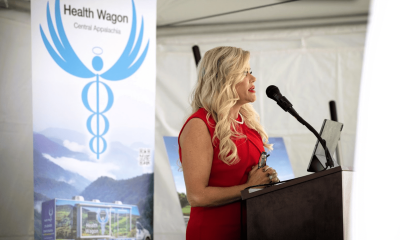US
Joe Biden Dominates Donald Trump in the 2020 US Presidential Election Race

Democrat Joe Biden has an edge over Republican leader Donald Trump as he registers a win in major US states. The 2020 US Presidential election results made available by the Associated Press has hinted that Joe Biden has received more votes in his favor. His win in Michigan and Wisconsin has brought him close to forming a majority.
As expected, this is turning out to be a strong battle between both the US presidential candidates namely, Joe Biden and Donald Trump. After seeing the excessive vote count in Joe Biden’s favor, Donald Trump has responded with fury. He has even launched a legal onslaught over battleground-state votes.
According to Trump, his campaign is devoid of meaningful access to counting locations for observing the process for opening and tabulating ballots as stated under the state law. In its response, Joe Biden’s team has prepared itself to take the necessary steps to face Trump’s legal onslaught effectively.
When the vote-counting began, it seemed to a tough battle between Trump and Biden as the two had a little difference in the vote count. But as the time progressed, Joe Biden started to gain momentum in key US states and it has cleared the path for his win in the 2020 US Presidential election.
After Biden’s wins in the Great Lakes states, he reached 264 whereas Trump is at 214. Biden is just one battleground state away to cross the mark of 270 votes to become the US president this year. Joe Biden has received over 71 million votes and this year over 100 million Americans have cast their ballots before the Election day to ensure their safety from the Covid-19 pandemic.
US
Creating Safe Havens: Inside Genesis USA’s Vision for Inclusive Housing

GenesisUSA, a nonprofit based in Arlington, Texas, works to improve the lives of disabled veterans and children who have lost their parents. Led by Charles Ford, the organization goes beyond providing financial aid. It focuses on long-term solutions, like building wheelchair-accessible homes, to support independence and dignity for those in need. With rising housing costs and growing inequality, GenesisUSA’s mission addresses a critical gap.
Ford and his team create supportive environments that help promote self-reliance in underserved communities. As a smaller, community-based organization, it addresses challenges that can be difficult for larger organizations to manage. Its work shows how local initiatives can make a noticeable difference.
A Growing Crisis: The Need for Accessible Housing
The demand for affordable and accessible housing continues to grow. A 2023 report from the National Low Income Housing Coalition estimated that more than 11 million U.S. households need homes with accessibility features. This challenge is more pronounced for disabled veterans, with nearly four million living in homes that do not meet their physical needs.
“Our veterans have sacrificed a lot for this country, but many still face housing that doesn’t suit their needs,” Ford says. “Beyond merely providing them shelter, we’re creating a space where they can live comfortably.”
GenesisUSA is responding by building homes designed for accessibility. These houses include ramps, wider doorways, and modified kitchens and bathrooms to allow veterans to live more independently. The organization also plans to create supportive environments for children who have lost their parents, many of whom also face mobility challenges.
Ford’s Community-Driven Leadership at GenesisUSA
Ford’s years of experience in construction and his dedication to charitable work have shaped his leadership at GenesisUSA. He stays closely involved, often meeting veterans and families to learn about their needs firsthand. “For me, it’s about building personal connections,” Ford says. “Large charities sometimes miss the individual stories.”
The community focus defines Ford’s leadership. Although some wonder if a smaller nonprofit can make a meaningful impact, Ford is confident. “We don’t have celebrity endorsements or huge budgets, but we have real relationships with the people we help,” he says. His dedication to grassroots efforts sets GenesisUSA apart from larger, more structured organizations.
GenesisUSA has already helped over 100 people and aims to expand its impact with affordable, accessible housing solutions. One notable feature is the inclusion of a wheelchair-accessible swimming pool, which has received positive feedback. Ford says, “We’re creating spaces where people can enjoy life fully, just like everyone else,” which reflects the organization’s mission to support independence and inclusion.
Building More Than Homes: A Reflection of Hope
Ford looks back on GenesisUSA’s progress with a clear sense of purpose. “We’re not simply building homes, we’re offering hope and building opportunities for independence,” he says. “We’re here to support veterans who face mobility challenges and children who have lost their parents, offering them a chance at a more self-reliant life.”
As the organization’s reach expands, so does its ability to impact lives across the country. Its work embodies Ford’s dedication to ensuring that no one is overlooked. Ford envisions scaling their efforts while maintaining the personalized approach that defines their model.
“We’re still in the early stages,” he notes. “As we grow, we’ll continue to prioritize individual needs. Our success hinges on the improved quality of life for each person we help.”
As the demand for accessible, supportive housing rises, organizations like GenesisUSA play an important role in filling gaps left by larger institutions and government programs. Through its focus on tailored support and community-driven solutions, GenesisUSA is building a model for how smaller nonprofits can significantly impact and address pressing social needs.
-

 Tech4 years ago
Tech4 years agoEffuel Reviews (2021) – Effuel ECO OBD2 Saves Fuel, and Reduce Gas Cost? Effuel Customer Reviews
-

 Tech6 years ago
Tech6 years agoBosch Power Tools India Launches ‘Cordless Matlab Bosch’ Campaign to Demonstrate the Power of Cordless
-

 Lifestyle6 years ago
Lifestyle6 years agoCatholic Cases App brings Church’s Moral Teachings to Androids and iPhones
-

 Lifestyle4 years ago
Lifestyle4 years agoEast Side Hype x Billionaire Boys Club. Hottest New Streetwear Releases in Utah.
-

 Tech6 years ago
Tech6 years agoCloud Buyers & Investors to Profit in the Future
-

 Lifestyle5 years ago
Lifestyle5 years agoThe Midas of Cosmetic Dermatology: Dr. Simon Ourian
-

 Health6 years ago
Health6 years agoCBDistillery Review: Is it a scam?
-

 Entertainment6 years ago
Entertainment6 years agoAvengers Endgame now Available on 123Movies for Download & Streaming for Free












